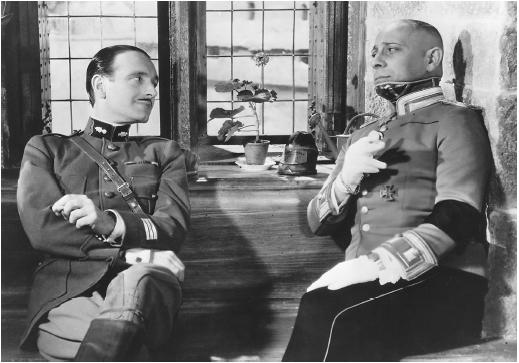
Film Friday
I wrote Tuesday and Wednesday about Robert Frost’s “Mending Wall” and the fences that divide us, both externally and internally. Today I write about one of the great humanistic films about dividing lines: Jean Renoir’s 1937 classic La Grande Illusion.
The final scene of the film reminds me of “Mending Wall.” Two World War I French prisoners have escaped from the Germans and have just made it to neutral Switzerland. A German patrol has been following their tracks in the snow and a soldier wants to shoot them, but his commander informs him that the two have crossed the border and are now safe. The viewer can see no border, however. The snow stretches in an undifferentiated plane. Humans make boundaries and then engage in horrendous bloodlettings to maintain them. Nature, like the frozen groundswell that doesn’t like Frost’s wall, is impervious to boundaries.
This is not the only boundary in Renoir’s film. Deeper than national boundaries is the boundary between the elite officer class and the new Europe that is emerging. Erich Von Stroheim, playing the role of his life as Captain von Rauffenstein, is the rigid German officer who will fraternize with the French commander Bouldieu but not with the working class Marechal or the Jewish banker Rosenthal. He is fatalistic over the fact that old-time chivalry is dead and that others represent the future:
Capt. Boeldieu: I think we can do nothing to stop the march of time.
Capt. von Rauffenstein: Believe me, I don’t know who is going to win this war in the end. But it will be the end of the Rauffensteins and the Boeldieus.
Rauffenstein and Boeldieu differ, however, in that one spurns the future and the other accepts it, even though it means his death. Boeldieu sacrifices himself during the escape, forcing Rauffenstein to shoot him so that the other two can make it over the wall. In one of the great death scenes in film history,Rauffenstein cuts his beloved rose, the only living plant in the fortress, when the French captain dies.
Although Boeldieu has made way for the new France, however, divisions haven’t vanished entirely. Marechal and Rosenthal may huddle together for warmth at one point, but at another they argue and Marechal calls Rosenthal a “dirty Jew.” This is Renoir’s acknowledgement of French working class anti-semitism. But they come back together and, by the end of the movie, make it to Switzerland.
Of course, they will then return to the war effort, and the bloodletting over boundaries will continue.
There is also a scene of borders crossed when the two come across a German woman and her daughter (her husband has been killed) and live with her while Marechal recovers from a hurt leg. Religious boundaries as well as national boundaries are transcended as Rosenthal participates in a Christmas ritual.
The “grand illusion” in the title may be ironic. Is it really grand, after all, to be under the illusion that we are different and must fight, even though we share a common humanity?
Today it is difficult to watch Grande Illusion without thinking about what would come: Germany’s conquest of France and then the holocaust, in which France participated. Is Renoir naïve that a common humanity can prevail over entrenched antagonisms.
And isn’t this the drama we are playing out in the United States today? Perhaps the hysterical Tea Party reactions to immigrants and a black president represent a Rauffenstein response to change.
But if so, then it is important to acknowledge the Boeldieus who accept that a new order is coming, even if it means that they will be left behind. They are those unappreciated pathfinders who come to seem hopelessly old-fashioned by the next generation but who don’t complain or even seem to mind. They do what they can for the cause of progress and then get out of the way and wish the next generation “God speed.”


3 Trackbacks
[…] the allusions. There is even a reference to the 1937 Jean Renoir film Grande Illusion, which I wrote about recently. Mr. Potato Head, like Boeldieu, at one point creates a diversion by staging a phony escape, and […]
[…] film in a “Fences” series I have been running. (The previous films, also receiving posts, were Grand Illusion and Touch of Evil.) Franco Brusati’s 1976 gem Bread and Chocolate got me thinking about the way […]
[…] Jean Renoir, Grand Illusion […]